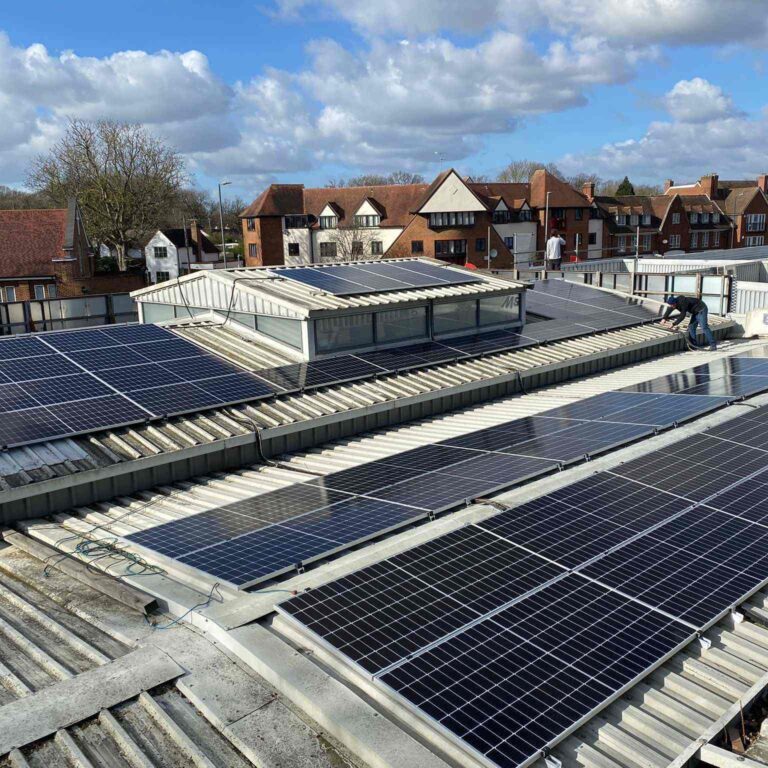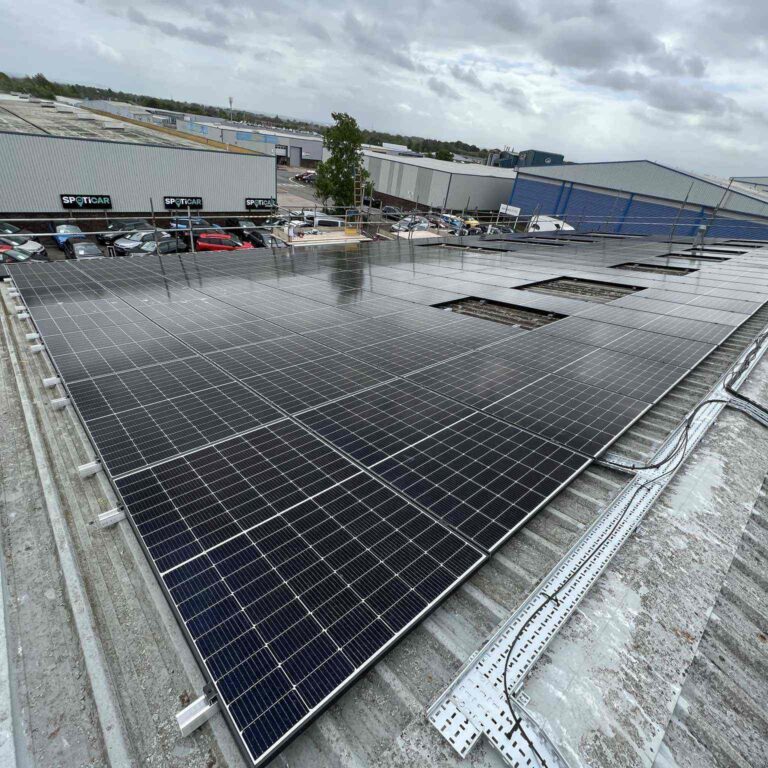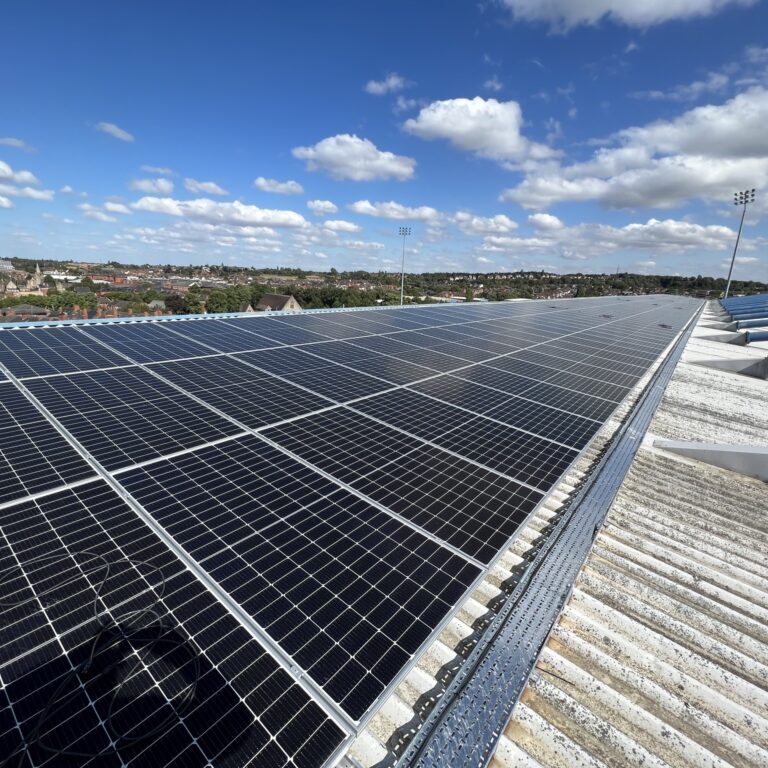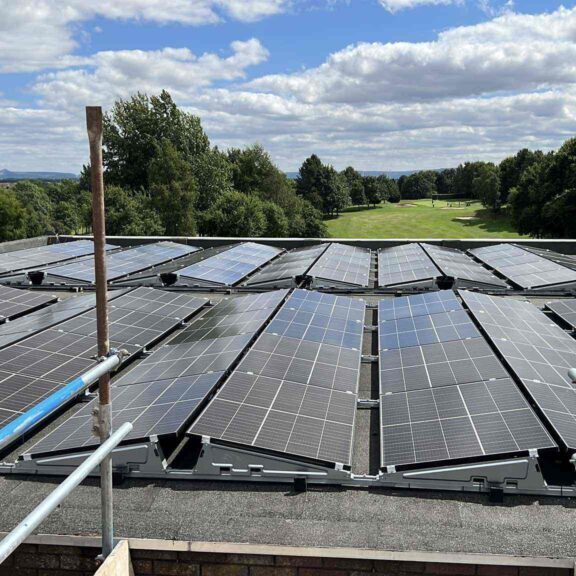In the rapidly evolving field of renewable energy, commercial solar inverters are a pivotal component for businesses looking to harness solar power efficiently. For UK companies considering a solar energy investment, understanding commercial solar inverters is crucial for maximizing the benefits of a solar photovoltaic (PV) system. This guide explores what commercial solar inverters are, why they matter, and how they can enhance your business’s solar energy strategy.
What Are Commercial Solar Inverters?
Commercial solar inverters are devices that convert the direct current (DC) electricity generated by solar panels into alternating current (AC) electricity, which is the form used by most commercial appliances and the national grid. Without commercial solar inverters, the energy produced by solar panels cannot be used to power your business or fed back into the grid.
There are several types of commercial solar inverters, including string inverters, central inverters, and microinverters. Each type has its own advantages and is suitable for different types of commercial solar installations. Choosing the right commercial solar inverter is essential for optimizing energy production and ensuring the longevity and efficiency of your solar PV system.
Why Commercial Solar Inverters Matter
Understanding the role of commercial solar inverters is vital for several reasons:
1. Maximizing Energy Efficiency
Commercial solar inverters play a crucial role in ensuring that the energy produced by solar panels is converted into usable electricity efficiently. High-quality commercial solar inverters can maximize the amount of energy that is converted and used, which directly impacts the overall efficiency of your solar PV system. By selecting the right commercial solar inverter, UK businesses can improve their energy yield and reduce energy costs.
2. Enhancing System Performance
The performance of your solar PV system heavily depends on the quality and type of commercial solar inverter used. Advanced commercial solar inverters offer features such as MPPT (Maximum Power Point Tracking), which optimizes the power output of the solar panels by adjusting to varying light conditions throughout the day. This ensures that your solar system operates at peak performance, regardless of weather changes or shading issues.
3. Monitoring and Diagnostics
Many commercial solar inverters come equipped with monitoring and diagnostic features that allow businesses to track the performance of their solar PV system in real-time. This capability is essential for identifying any issues or inefficiencies early on, ensuring that the system is running optimally and any necessary maintenance can be promptly addressed.
4. Grid Compliance and Safety
Commercial solar inverters ensure that the electricity produced by your solar PV system meets the required standards for safety and compatibility with the national grid. Compliance with grid regulations is crucial for avoiding penalties and ensuring that your solar energy system operates safely and effectively. High-quality commercial solar inverters come with built-in safety features to protect against issues such as electrical faults and overvoltage.
Types of Commercial Solar Inverters
When selecting commercial solar inverters for your business, it’s important to understand the different types available and their suitability for your specific needs:
1. String Inverters
String inverters are one of the most common types used in commercial solar installations. They are connected to a series (or “string”) of solar panels and are generally cost-effective for medium to large installations. String inverters are ideal for systems with minimal shading issues and are known for their reliability and efficiency.
2. Central Inverters
Central inverters are larger and more powerful than string inverters, making them suitable for large-scale commercial solar installations. They are designed to handle multiple strings of solar panels and are often used in utility-scale solar farms. Central inverters offer high efficiency and are known for their durability and performance in large installations.
3. Microinverters
Microinverters are installed on each individual solar panel, allowing for independent operation of each panel. This type of commercial solar inverter is ideal for installations with varying shading conditions or complex roof layouts. Microinverters can optimize the performance of each panel, resulting in higher overall energy production and better performance in partial shading scenarios.
How to Choose the Right Commercial Solar Inverter
Selecting the right commercial solar inverter involves considering several key factors:
1. System Size and Type
The size and type of your solar PV system will influence the choice of commercial solar inverter. For large-scale installations, central inverters may be more appropriate, while smaller systems might benefit from string inverters or microinverters. Assessing your system’s requirements will help you choose the most suitable commercial solar inverter.
2. Efficiency and Performance
Evaluate the efficiency and performance features of different commercial solar inverters. Look for models with high efficiency ratings and advanced features such as MPPT and real-time monitoring. Ensuring that the commercial solar inverter can handle your system’s capacity and environmental conditions is crucial for optimal performance.
3. Warranty and Support
Consider the warranty and support offered by the manufacturer of the commercial solar inverter. A robust warranty and reliable customer support are essential for ensuring the longevity and maintenance of your solar PV system. Choose a commercial solar inverter from a reputable manufacturer with a proven track record of quality and service.
4. Cost and Return on Investment
While cost is an important factor, it’s essential to consider the overall return on investment (ROI) when selecting a commercial solar inverter. Investing in a high-quality commercial solar inverter may involve a higher upfront cost but can result in greater energy savings and improved system performance over time.
Benefits of Installing Commercial Solar Inverters
Investing in high-quality commercial solar inverters offers several benefits for UK businesses:
- Cost Savings: By optimizing energy conversion and efficiency, commercial solar inverters can help reduce electricity costs and improve ROI on your solar investment.
- Enhanced Performance: Advanced features in commercial solar inverters ensure that your solar PV system operates at peak performance, maximizing energy production.
- Sustainability: Utilizing solar energy with effective commercial solar inverters contributes to your company’s sustainability goals and reduces reliance on fossil fuels.
Conclusion
Commercial solar inverters are a critical component of any solar PV system, playing a key role in converting and optimizing solar energy for your business. By understanding the different types of commercial solar inverters, their benefits, and how to choose the right one, UK companies can make informed decisions and enhance their solar energy strategy.
For businesses looking to invest in solar energy, selecting the appropriate commercial solar inverter is essential for maximizing efficiency, reducing costs, and achieving sustainability goals. With the right commercial solar inverter, your business can enjoy the full benefits of solar power and contribute to a greener future.
Invest in quality commercial solar inverters today and take the first step towards a more sustainable and cost-effective energy solution for your business.



